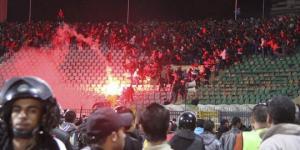Submitted by ICConline on
On 2 February, the football match between the Port-Saïd team Al-Masry and the Cairo side Al-Ahly ended in a bloodbath: 73 dead and a thousand injured. The final whistle had just been blown – Al-Masry had won it - when local supporters, or people claiming to be, invaded the pitch and terraces, viciously attacking players and supporters of the Cairo team. During all this mayhem, with bottles, stones and fireworks flying all over the place, and in which the majority of dead were smothered or trampled in the resulting stampede, the police did not intervene. Even though football matches in Egypt have often seen very violent clashes between supporters, which is why they are often very tightly marshalled by the forces of order, on this occasion a lot of questions have been asked about the attitude of the police. According to a number of observers and testimonies, the police seemed to be allowing this explosion of hatred to take place. There are photos of police officers turning their back on the general chaos, as though nothing was happening; and the question is clearly posed whether this was a carefully orchestrated provocation, with cops infiltrated into the Port-Saïd supporters to stir things up and push things towards a massacre. “This was a programmed war” was the accusation of Ehab Ali, Al-Masry’s team doctor who witnessed the passivity of the security forces for a whole hour.
It looks like the new government was attempting to send out a message to opponents of the new regime made up of the army and the Muslim Brotherhood, via this assault on the Al-Ahly supporters[1]. These supporters, many of them sons of workers, took a frontline role in the fight against Mubarak and were very active in the confrontations with the police in Tahrir Square. They see themselves as ‘ultras’, i.e. a radical part of the rebellious youth which is out to change things in Egypt. One of their favourite slogans is “down with the military regime”, and one of their favourite songs is “All Cops are Bastards” – they often wear the acronym “ACAB”. Some of them have even given out a pamphlet called “The crimes against the revolutionary forces will not stop or scare the revolutionaries”.
During the match on 2 February, the Port Said supporters were chanting slogans in favour of the Supreme Council of the Armed Forces, and thus in opposition to the Cairo supporters. But what might have been just another episode in the nationalist and localist craziness which is increasingly infecting sport, and which is assiduously promoted by the media, now became a real “lesson” aimed at the opponents of the existing regime.
This was not just aimed at the young people who make up the ultras – many of whom have overcome the divisions between different groups of supporters to fight together against the post-Mubarak regime – but also and above all at the entire Egyptian population[2]. And it seems that the population knew it: the day after the tragedy, Cairo and other towns saw two days of very violent confrontations in which the police responded to the crowd with live ammunition. In the capital, the Interior Ministry was besieged and attacked. Officially there were ten deaths and hundreds of injuries, which made the population even more angry: “they know how to protect a ministry, but not a stadium”, as the demonstrators put it. They also called for the execution of Field Marshall Tantawi.
This reaction by the population was entirely legitimate, but it fell into the trap of responding to repression by rioting. Immediately after the macabre match in Port-Saïd, the town, along with a number of others in the country, was immediately and heavily patrolled by the army, proof that the regime knew what it was doing, that it was expecting riots and was ready to deal with them.
We need to look at things in a sober way. Popular revolt in the street, however ‘ultra’, is not enough to change society and it does not equal revolution. Let’s not forget that what forced Mubarak to stand down last year was not just the social revolt but above all the workers’ strikes which spread throughout the country and really scared the Egyptian and international bourgeoisie. The Egyptian and American bourgeoisie accelerated the departure of the old dictator in order to prevent this class movement from coming to the fore, from developing to the point where it could undermine illusions in ‘democracy’ and serve as an example to the working class across the world.
Wilma 17/2/12
[1] Henri Michel, who coached the Egyptian team Zamalek between 2007 and 2009, declared on RTL: “I have never felt that sort of danger in any part of Egypt. Passions were inflamed. Accidents can happen but there’s a long way between that and the drama that took place. I never thought such a thing could happen”.
[2] It was probably no accident that these events took place at a time when massive demonstrations were being planned to commemorate the “battle of the camels” of 2 February 2011, when Mubarak’s thugs attacked the demonstrators in Tahrir Square.







 del.icio.us
del.icio.us Digg
Digg Newskicks
Newskicks Ping This!
Ping This! Favorite on Technorati
Favorite on Technorati Blinklist
Blinklist Furl
Furl Mister Wong
Mister Wong Mixx
Mixx Newsvine
Newsvine StumbleUpon
StumbleUpon Viadeo
Viadeo Icerocket
Icerocket Yahoo
Yahoo identi.ca
identi.ca Google+
Google+ Reddit
Reddit SlashDot
SlashDot Twitter
Twitter Box
Box Diigo
Diigo Facebook
Facebook Google
Google LinkedIn
LinkedIn MySpace
MySpace